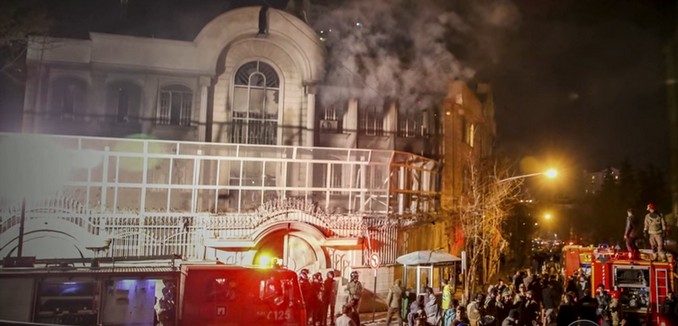Saudi Arabia’s allies announced that they were following Riyadh’s lead and cutting diplomatic ties with Iran after an attack on the kingdom’s embassy in Tehran, the Associated Press reported on Monday.
Saudi Arabia executed 47 prisoners, including Sheikh Nimr al-Nimr from the kingdom’s predominantly Shiite eastern province, for terror-related offenses on Saturday. After al-Nimr’s execution, Iranian rioters torched and ransacked the Saudi embassy, while Iranian Supreme Leader Ayatollah Ali Khamenei warned that Riyadh would face “divine revenge.”
Following the attack on the embassy, the AP reported that Saudi Foreign Minister Adel al-Jubeir said that all Iranian diplomatic personnel had 48 hours to leave Saudi Arabia while all Saudi diplomats were being recalled from Iran. On Monday, al-Jubeir added that the kingdom will cut air traffic with Iran, putting a stop to trade relations and forbidding its citizens from traveling to the Islamic Republic.
Saudi allies Sudan, the United Arab Emirates, and Bahrain similarly protested the attack on the kingdom’s embassy by downgrading or cutting ties with Tehran. Khartoum announced that it was expelling its Iranian ambassador, while the UAE recalled its own ambassador to Iran and called for a reduction in the size of Tehran’s diplomatic corps in the Emirates. Bahrain, which expelled its own Iranian diplomats after accusing Tehran of supporting terrorist groups within its territory in October, said that Saturday’s attack “confirms a determination to spread devastation and destruction, and provoke unrest and strife in the region by providing protection and support for terrorists and extremists and the smuggling of weapons and explosives for use by its affiliated terrorist cells.”
On Sunday, Jubeir told a press conference that Iran had “a long record of violations of foreign diplomatic missions,” going back to the storming of the American embassy in 1979, and that such actions were “a flagrant violation of all international agreements.” Jubeir also accused Iran of “destabilizing the region’s security,” observing that the “history of Iran is full of negative and hostile interference in Arab countries, always accompanied with subversion, demolition and killing of innocent souls.”
Jubeir was the target of an assassination plot in Washington D.C. by Iran’s Islamic Revolutionary Guard Corps in 2011, while he served as the Saudi ambassador to the United States.
Iran’s behavior has gotten consistently more aggressive since the announcement of the nuclear deal, prompting a recent editorial (Google link) in The Wall Street Journal to observe:
Opponents of the nuclear accord predicted this. Mr. Obama says the deal restricts Iranian action, but it does far more to restrict the ability of the U.S. to respond to Iranian aggression. If the U.S. takes tough action in response to Iran’s missile tests or other military provocations, Iran can threaten to stop abiding by the nuclear deal. It knows the world has no appetite for restoring serious sanctions, and that Mr. Obama will never admit his deal is failing. The mullahs view the accord as a license to become more militarily aggressive.
In August, Hamad al-Harashani, a senior Kuwaiti parliamentarian accused Iran of of being the “true enemy” of the Gulf States and “seeking to spread chaos” across the region following a terror attack in Bahrain that killed a policeman and injured several others. The explosives used in the attack were similar to those discovered by Bahraini authorities in July that were believed to have originated in Iran.
[Photo: CBS Evening News / YouTube ]




